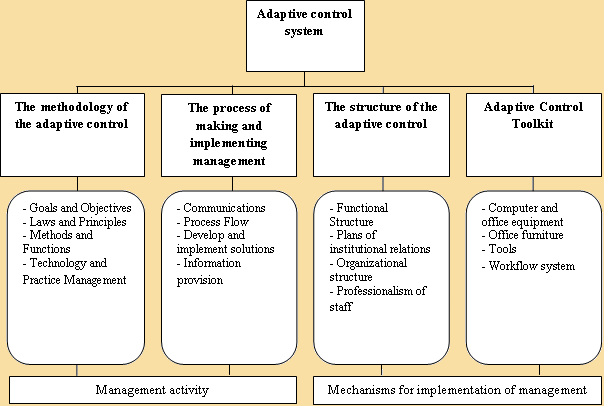Abstract
Contents
- Introduction
- 1. Theme urgency
- 2. Goal and tasks of the research
- 3. Logistical adaptive enterprise management
- Conclusion
- References
Introduction
In order to adapt the process of logistics enterprises to dynamically transforming environmental conditions were targeted, they have to manage. In a rapidly changing situation, as outside the enterprise and within required a special approach to the organization of in-house management of business entities, due to the current need for them to respond flexibly to changes and adapt to them in order to prevent the crisis and the continued success of the operation.
The result of adaptive management is aimed at decision-making in the areas of adaptation and building a model of adaptation and, therefore, the product of adaptive management – information used in the management of an enterprise to generate adequate measures to adapt the enterprise in the market environment. Adaptive control suggests that it depends on all the available information about the process at a given time, and focuses on the action of a control system to achieve the missing information.
1. Theme urgency
Formation of an adaptive management of the enterprise in the competitive environment due to many reasons. For effective management requires an innovative methodology for enterprise management in a competitive environment.
Research and analysis of enterprise problems by adapting the development of measures to increase the adoption and execution of decisions on the basis of management information taking into account the impact of the competitive environment. The lack of theoretical and methodological aspects of teaching and adaptive management of the enterprise, determines the relevance of the chosen theme of master's work.
2. Goal and tasks of the research
The aim of the study is the development and justification of theoretical and methodological aspects, as well as the construction of a simulation model of the formation and development of adaptive enterprise management environment based support system solutions.
The main objectives of the study:
• Clarify the categorical apparatus associated with adaptive management.
• Develop a methodology for adaptive control of the company.
• Develop theoretical positions of decision-making and execution.
• Develop a mechanism for the implementation of adaptive management in the enterprise
• To build a simulation model of adaptive management.
The object of this study is a pharmaceutical company.
Subject of research are theoretical and methodological principles of functioning and development of adaptive management of the enterprise.
3. Logistical adaptive enterprise management
Adaptive management of accumulating knowledge about the state and development of control systems, methods and tools of use to system objects can move from empiricism in management theory and practice to the professionalism of managers, that is, a science-based performance management activities [13, 8, 11].
The logic of the study of adaptive control is presented in four parts (Fig. 1). Each part of the structure of the adaptive system has its purpose and objectives, fulfills its function, technology, but there are some general rules of procedure, combining each element of the system. Methodology and process of making and implementing decisions shape management activities, and the structure and tools – the mechanism of the government.

Figure 1 – The logic of the study of adaptive control
The first part of the methodology of adaptive management integrates theory, economic categories, laws and principles, methods, functions, technology in some holistic system, which is implemented through the mechanism of control.
The goal of adaptive management is to find the most effective options for adoption and implementation of solutions aimed at the functioning and development of the company.
Flexible combination of methods and functions of the monitoring system will actively influence the competitiveness of enterprises in real time. Monitoring of key performance indicators can receive and execute informed management decisions.
The mechanism of interaction between theory and practice of adaptive management is to measure the state of the enterprise, technology use various lines of business and the growth of the professional competence of managers. The main role in the implementation of adaptive management plays a management decision [3, 8, 11].
The methodology of the theory of decision-making based on a set of concepts (a system of rationality, the best solution) and principles (objectives, the multiplicity of alternatives, measurement). Adaptive control synthesizes all kinds of concepts. In modeling the processes of adaptive management, the following structure (Fig. 2).

Figure
2 – The scheme of adaptive management process
(animation: 4 frames, 5 cycles of repeating, 14 kilobytes)
The main value of the use of indicators is that it allows you to achieve the goal of confronting managers, owners, investors enterprise by integrating the results into a coherent system of assessment and benchmarks.
Adaptive management of the enterprises need information exchange, which provides tracking of administrative decisions. Diverse set of administrative actions is reduced to a limited list of functions that make up the closed loop control. To carry out these functions, a single information-analytical support, and tools to track information such as monitoring the adoption and implementation of solutions. In the information space of the enterprise receives data from both the outside and the inside and from the environment. Thanks to the information system managers enterprises receive reliable gauges the results of their management efforts to address adaptation to the demands of the market, financial management, personnel management, and other areas of activity.
Mechanism for the implementation of adaptive management of the enterprise in a competitive environment is an integral part of the adaptive management of the enterprise, providing a purposeful influence on factors that affect the state of the company's competitiveness. The mechanism of adaptive management of the enterprise in a competitive environment is a set of principles, tools, and technology adoption and implementation of management decisions. Is implemented by monitoring the adoption and implementation of solutions based on governance indicators [3,8] .
Thus, adaptive management of enterprises can be represented in the broad and narrow sense.
In a narrow sense, adaptive management of enterprises as a special kind of enterprise management in a state of wavering from the stable equilibrium before its loss, which requires changes in elements of the management system to flexibly adapt to rapidly changing environments.
In a broad sense, adaptive management of enterprises – a management activity, presented as a set of interrelated impacts on facilities management aimed at maintaining competitiveness through the mechanism of management of innovation processes (monitoring the adoption and implementation of the decision) when the desired state of the system is determined on the basis of previous management process (ie, based on the accumulation of experience), by monitoring management performance. The result of adaptive management is to improve the competitiveness of enterprises.
Conclusion
In the study of the theoretical and methodological aspects of the features of adaptive management in the enterprises, the analysis of the problems of enterprise management, based on it done their ordering. Identified and classified the competitive impact. Refined theoretical propositions evaluation factors.
The essence, the role and place of adaptive management in the enterprise. Determined and proved the elements of the adaptive control system.
Substantiates the role and
place of information and analytical support in the process of adaptive
management. A scheme for adaptive management process. The technology of
the process of adoption and implementation of management decisions.
This master's work is not completed yet. Final completion: December 2013. The full text of the work and materials on the topic can be obtained from the author or his head after this date.
References
- Ансофф, И. Стратегическое управление: учеб. пособие / И. Ансофф. – М.: Экономика, 2006.– 358 с.
- Боумен, К. Основы стратегического менеджмента: учебник / К. Боумен. – М.: ЮНИТИ, 2004.– 175 с.
- Бушмелева Г.В. Адаптивное управление промышленным предприятием в конкурентной среде: Монография.-Екатеринбург: Изд-во Института экономики УрО РАН, 2008. - 12,55 п.л.
- Виханский, О.С. Менеджмент: учебник / О.С. Виханский, А.И. Наумов.– 3-е изд.– М.: Гардарики, 1999.– 528 с.
- Виханский, О.С. Стратегическое управление: учебник / О.С. Виханский.– 2-е изд., перераб. и доп.– М.: Гардарики, 2003.– 296 с.
- Деревицкий, Д. П. Прикладная теория дискретных адаптивных систем управления: учеб. пособие / Д. П. Деревицкий, А. Л. Фрадков. – М.: Наука, 2004.– 216 с.
- Иванов, А. Д. Формирование адаптационного механизма предприятия к конкурентной среде: учеб. пособие / А. Д. Иванов. – М.: Инфра-М, 2006.– 116 с.
- Кузьменко В.В., Гришин Д.В. «Теоретические аспекты функционирования адаптивной системы управления предприятием». Вестник СевКавГТУ. Серия «Экономика». № 2 (10), 2003. ISBN 5-9296-0140-2.
- Мазилкина, Е. И. Управление конкурентоспособностью: учеб. пособие / Е.И. Мазилкина, Г.Г. Паничкина.– М.: Омега-Л, 2007.– 325 с.
- Санталайнен Т. Управление по результатам: учеб. пособие / Т. Санталайнен, Э. Воути. – М.: Прогресс; Универс, 2007.– 320 с.
- Срагович, В. Г. Адаптивное управление: учеб. пособие / В. Г. Срагович. – М.: Наука, 2004.– 260 с.
- Стратегический маркетинг: учебник / Р.А. Фатхутдинов.– 3-е изд.– СПб.: Питер, 2003.– 347 с.
- Фатхутдинов, Р.А. Стратегический менеджмент: учебник / Р.А.Фатхутдинов.– 5-е изд., испр. и доп.– М.: Дело, 2002.– 448 с.
